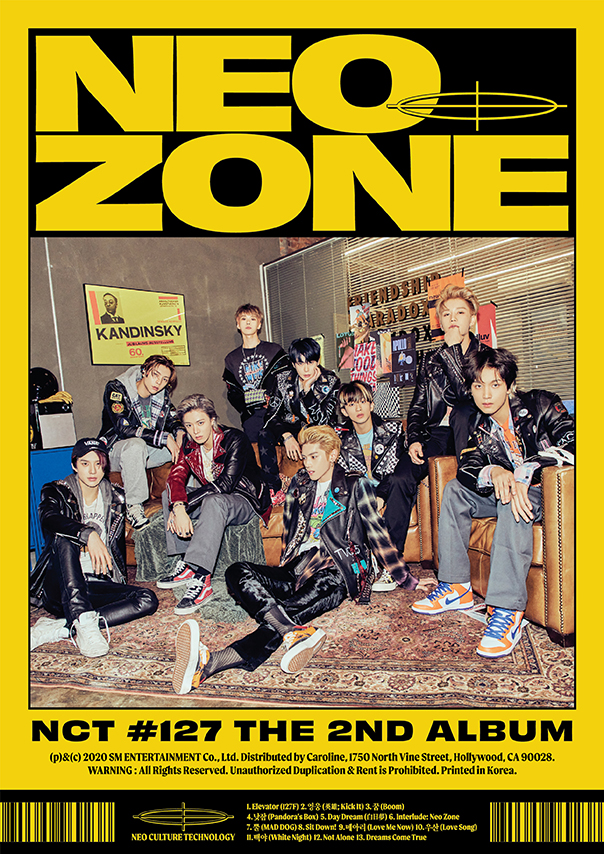ALBUM REVIEW: NCT 127 flashes back to the ’90s with ‘Neo Zone’

On its third full-length album, Neo Zone, K-pop band NCT 127, finds inspiration from American R&B groups and singers of the ’90s for the first half before taking a hard turn to a scattershot of genres and influences for the middle portion and rounding out the album with more R&B.
Neo Zone
NCT 127
Capitol Records, March 6
First, here’s a brief background for new fans: NCT is a Korean boy band that, as a whole, has 21 members and growing. Those members are spread out among four sub-units. So far, this includes NCT U, the debut branch of the experimental group; WayV, the band’s Chinese affiliate; and NCT Dream, which features younger members who can graduate out of the unit to one of the others when they turn 20. NCT 127, the most prolific to date, is based in Seoul—the 127 stands for Seoul’s longitude.
Long-time fans, of course, knew all of that and are welcome to elaborate and correct us in the comments.
With the backstory out of the way, we go back to Neo Zone. Right off the bat with “Elevator,” the first track, we’re introduced to a very ’90s vibe with smooth vocals, voicebox effects and a groovy thumping bass.
From that introduction, the second song, “Kick It,” goes in a harder direction. It sounds like a song that would kick in at the beginning of a video game boss fight. It features guitars, a trap beat and, crucially, the chorus “Kick it like Bruce Lee.” The verses are a bit all over the place, with each member seemingly contributing his own genre, at one point transitioning directly from a rap verse to a saccharine ballad delivery.
That said, you could still absolutely fight a boss to that chorus.
“Boom” could have come from the tail end of the ’90s boy band craze, with Spanish-inspired guitar and steel drums over vocals ranging somewhere between bubblegum pop and R&B. The R&B influence extends through “Pandora’s Box,” accompanied by a quicker beat with a more prominent snare.
The R&B influence remains in “Daydream,” but it moves from the vocals to the beat. While the singing takes on a cherubic quality, the beat wouldn’t be out of place on a mid-career Babyface song. Somehow it works, despite bringing the energy levels down a bit from the early tracks.
A brief EDM interlude transitions to a much more experimental feel for “MAD DOG.” With the shrill, metallic whine of what sounds like a broken trumpet over the chorus and a strange, droning, almost alien sound over a trap beat, it’s a fairly hard departure from the rest of the album. The vocals, likewise, are a harder, more traditional rap, even including tongue clicks reminiscent of Snoop Dogg’s classic “Drop It Like It’s Hot.”
“Sit Down!” continues the move to modern hip-hop with a distinct Migos triplet flow to the rap for many on the verses, though it keeps the R&B influence from earlier songs.
Rather than continuing the harder hip-hop vibe, “Love Me Now” is a fairly generic example of tropical-inspired club electronica. Textbook R&B crooner “Love Song” then jumps back to the 2000s. If it wasn’t sung in Korean and didn’t have a rap break in the bridge, it could have passed for a lost Boyz II Men deep cut.
“White Night” travels back to the ’90s with a harmonizing piano-led R&B slow jam. Even if you don’t understand the language NCT 127 is singing in, you know exactly who the group is singing to and what its singing about.
The harmonies remain on “Not Alone,” but the instrumentals are stripped down to a sort of hip-hop-lite beat. Otherwise, it’s another boy band love song—typical for the genre.
NCT 127 returns to R&B with closing track “Dreams Come True,” which recalls Jagged Edge. The jazz trumpet and piano add complexity to the verses while the harmonies on the chorus bridge the gap between soul and pop.
The blending of genres on Neo Zone makes the still-evolving genre of K-pop more exciting. However, one gets the feeling that the first five songs would have been more coherent as the band’s seventh EP, perhaps joined by some of the later tracks. The loss of musical consistency in the middle of the album can be jarring.
Onome Uyovbievbo contributed to this review. Follow Uyovbievbo at Twitter.com/noitsonome and Instagram.com/ono.photography. Follow editor Daniel J. Willis at Twitter.com/BayAreaData.
